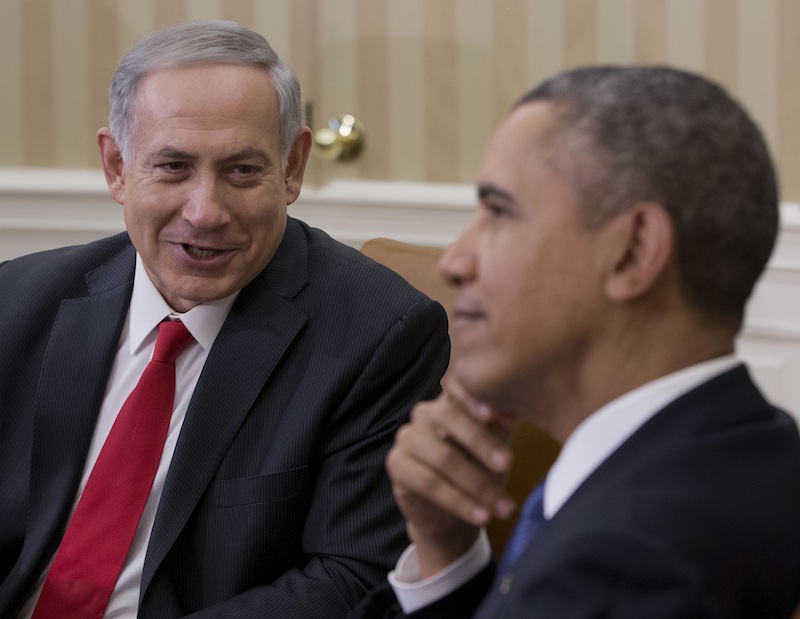WASHINGTON — Seeking to salvage an elusive Middle East peace plan, President Barack Obama pressed Israeli Prime Minister Benjamin Netanyahu Monday to make the “tough decisions” needed to move forward on talks with the Palestinians.
But facing a U.S.-imposed April deadline, the Israeli leader declared pessimistically that, “Israel has been doing its part and, I regret to say, the Palestinians have not.” Netanyahu’s comments underscored the slim prospects of reaching an agreement to the long-running conflict, despite a robust effort led by Secretary of State John Kerry.
Obama and Netanyahu spoke before an Oval Office meeting on a snowy Monday in Washington. The meeting marked a more direct foray into the peace negotiations by Obama, who will also meet at the White House later this month with Palestinian Authority President Mahmoud Abbas.
“It is still possible to create two states, a Jewish state of Israel and a state of Palestine, with people living side by side in peace and security,” Obama said. “But it’s difficult. It requires compromise on all sides.”
While the relationship between Obama and Netanyahu has improved after early tensions, the two leaders still grapple with deep differences, particularly on Iran. Israel sees Iran’s nuclear program as an existential threat and fears Tehran is using U.S.-led negotiations to stall while it builds a bomb.
Obama, seeking to reassure Netanyahu, affirmed his “absolute commitment that Iran does not acquire a nuclear weapon.”
Netanyahu insisted Monday that Iran must suspend all uranium enrichment, though any final deal between the international community and Iran would likely leave the Islamic republic with a small enrichment capacity.
“No country has a greater stake in this,” said Netanyahu, who is in Washington to speak at the annual meeting of AIPAC, the largest pro-Israel lobby.
Obama, who has twice addressed the conference, is not speaking this year, though Kerry was scheduled to speak Monday night.
In excerpts released ahead of his speech, Kerry outlined what he called “the endgame” in the peace negotiations. He said a peace deal must include security arrangements that leave Israel more secure, mutual recognition of states for the Jewish and Palestinian people, an end to all conflict, a just solution for Palestinian refugees, and an resolution “that finally allows Jerusalem to live up to its name as the city of peace.”
Kerry has made nearly a dozen trips to the region over the past year and is seeking to get both sides to sign a framework by the end of April that would serve as a guide for negotiations on a permanent solution to the conflict between the Israelis and Palestinians. The framework aims to address the core issues in the dispute, including borders between Israel and a future Palestine, the fate of Palestinian refugees and the status of the holy city of Jerusalem.
Even as Obama and Netanyahu met, developments in the Middle East underscored the difficulties in settling the intractable conflict.
New Israeli housing statistics showed that Israel began building more than twice as many West Bank settlement homes in 2013 than it did the previous year. The Palestinians consider settlements built on territories captured by Israel in 1967 to be illegal and an obstacle to peace.
In Gaza, meanwhile, Israel launched an airstrike that killed a Palestinian militant, officials and his family said.
The Palestinians seek the West Bank, east Jerusalem and the Gaza Strip — the Israeli captured in 1967 — for an independent state. They have demanded that Israel agree to base the final borders with a future Palestine on the pre-1967 lines, with small land swaps that would allow Israel to keep some of the Jewish settlements it has built in the West Bank and east Jerusalem.
Netanyahu has refused to recognize the 1967 lines as a starting point. He wants to retain an Israeli presence in a strategic area of the West Bank along the border with Jordan and keep large blocs of settlements closest to Israel. He has given no indication as to how much territory he is willing to cede, and he has rejected any division of east Jerusalem, the Palestinians’ hoped-for capital.
Netanyahu has also demanded that the Palestinians recognize Israel as the homeland of the Jewish people. The Palestinians reject this out of hand, saying it would undermine the rights of displaced Palestinian refugees who claim properties in what is now Israel as well as the rights of Israel’s Arab minority.
The Palestinians fear the emerging American proposal will largely side with Israel, particularly on the Jewish state, and by including only a vague mention of Palestinian “aspirations” in Jerusalem, rather than a specific reference to east Jerusalem.
Send questions/comments to the editors.



Success. Please wait for the page to reload. If the page does not reload within 5 seconds, please refresh the page.
Enter your email and password to access comments.
Hi, to comment on stories you must . This profile is in addition to your subscription and website login.
Already have a commenting profile? .
Invalid username/password.
Please check your email to confirm and complete your registration.
Only subscribers are eligible to post comments. Please subscribe or login first for digital access. Here’s why.
Use the form below to reset your password. When you've submitted your account email, we will send an email with a reset code.